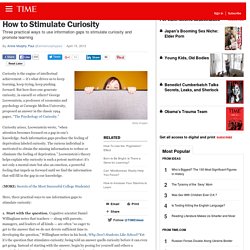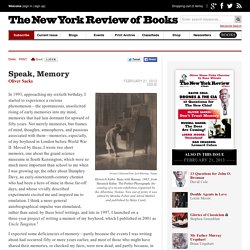

How to Stimulate Curiosity and Promote Learning. Curiosity is the engine of intellectual achievement — it’s what drives us to keep learning, keep trying, keep pushing forward.

But how does one generate curiosity, in oneself or others? George Loewenstein, a professor of economics and psychology at Carnegie Mellon University, proposed an answer in the classic 1994 paper, “The Psychology of Curiosity.” Curiosity arises, Loewenstein wrote, “when attention becomes focused on a gap in one’s knowledge. Such information gaps produce the feeling of deprivation labeled curiosity. The story of the self. Memory is our past and future.

To know who you are as a person, you need to have some idea of who you have been. And, for better or worse, your remembered life story is a pretty good guide to what you will do tomorrow. Speak, Memory by Oliver Sacks. In 1993, approaching my sixtieth birthday, I started to experience a curious phenomenon—the spontaneous, unsolicited rising of early memories into my mind, memories that had lain dormant for upward of fifty years.

Not merely memories, but frames of mind, thoughts, atmospheres, and passions associated with them—memories, especially, of my boyhood in London before World War II. Moved by these, I wrote two short memoirs, one about the grand science museums in South Kensington, which were so much more important than school to me when I was growing up; the other about Humphry Davy, an early-nineteenth-century chemist who had been a hero of mine in those far-off days, and whose vividly described experiments excited me and inspired me to emulation.